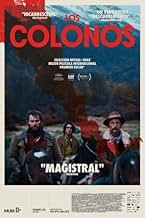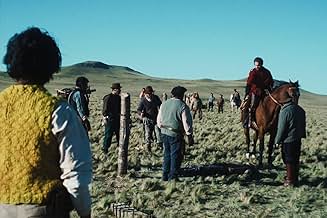NOTE IMDb
6,9/10
6,2 k
MA NOTE
Trois cavaliers partent à la conquête d'une vaste propriété. Accompagnant un soldat britannique et un mercenaire américain, Segundo, tireur d'élite métis, se rend compte que leur véritable m... Tout lireTrois cavaliers partent à la conquête d'une vaste propriété. Accompagnant un soldat britannique et un mercenaire américain, Segundo, tireur d'élite métis, se rend compte que leur véritable mission est de "supprimer" la population indigène.Trois cavaliers partent à la conquête d'une vaste propriété. Accompagnant un soldat britannique et un mercenaire américain, Segundo, tireur d'élite métis, se rend compte que leur véritable mission est de "supprimer" la population indigène.
- Réalisation
- Scénario
- Casting principal
- Récompenses
- 17 victoires et 27 nominations au total
Mishell Guaña
- Kiepja
- (as Mishell Guaña Montoya)
Avis à la une
This revisionist western from Chile is a bleak and alarming tale which is based on the very real racism of colonialism, which targeted the indigenous people of that area circa 1900. The story is pretty simple and has a land baron send three men to clear the way for him, an ex-Army Brit, an American mercenary and a Mestizo, who is roped in somewhat uneasily due to his shooting skills. There are a minimal number of set-pieces which are based around the over-riding scenario of a genocide of a people whose misfortune was to live in a place landmarked for sheep.
It's mostly an ugly and brutal film, with a particularly depressing encounter where a group of natives are murdered and a woman raped. But the point is to show the horrors of colonialism in this land and what crimes were committed in its name. The story latterly also looks at how the authorities, under the guise of good intentions, buried the grim truth and promoted an idealistic myth. All-in-all, a pretty interesting and disquieting film, which also benefits from some great cinematography of some stunning Patagonian vistas.
It's mostly an ugly and brutal film, with a particularly depressing encounter where a group of natives are murdered and a woman raped. But the point is to show the horrors of colonialism in this land and what crimes were committed in its name. The story latterly also looks at how the authorities, under the guise of good intentions, buried the grim truth and promoted an idealistic myth. All-in-all, a pretty interesting and disquieting film, which also benefits from some great cinematography of some stunning Patagonian vistas.
The film is not bad, but the poverty and suffering of a people and natives are shown in a very gentle way and everything seems poetic, without any particular fervor. I gave 7, because of the other things, especially because of photography, but all together it is less than 7. Why? Mostly because of American-English cast. They are more for a TV show than for the big screen of the cinema. Given that this is Galvez's debut, it must be noted that he really committed to being as faithful as possible to the depiction of his country's history, not too aggressive, but still quite poetically mild. In any case, the cruel and murderous attitude of the colonists towards the natives was shown.
I've watched it at the Film Festival in Warsaw, Poland. In my opinion it's a masterpiece. Though it makes for a bleak and depressing viewing, as it demontrates the cynicism, barbaric cruelty and racism of the white colonizers towards the indigenous inhabitants of Patagonia at the end of the 19th century, it certainly is worth your time and the price of a cinema admission. I recommend watching it in a cinema, because it looks and sounds superbly. In fact every aspect of the filmmaking craft is excellent here: the direction, the script, acting, music and cinematography. Worth mentioning is the participation of the British ex-soldiers and a Texan in those events, it allows the film to indicate that the barbarity and greed demonstrated in Chile weren't something exceptional and peculiar but rather commonplace, similar atrocities were committed against the indigenous people in North America and by the British throughout their colonial empire.
Well, difficult to decide. We have been to Chile, a magnificent country, so beautiful and savage at the same time.
This film purports to tell the story of the foundation, or attempted foundation of Chile, at the start of the 20th century. I say "purports" because certain elements don't quite fit.
If you see it, can you divine how or why the half cast character decides to eliminate the indigenous peoples? He pretends to shoot them, he refuses to do what he is told by his supposed boss, a British ex soldier, and other oddities.
It can certainly be interpreted as a sideways view of the abuses of the colonisers, presuming on the well known terrible history of their invasion, but perhaps little else.
The presentation is unusual, but may be an interpretation of the horrors. Filmed mostly in the dark of winter, it is certainly not a tourist advertisement.
Interesting? Yes, but only as a viewpoint.
This film purports to tell the story of the foundation, or attempted foundation of Chile, at the start of the 20th century. I say "purports" because certain elements don't quite fit.
If you see it, can you divine how or why the half cast character decides to eliminate the indigenous peoples? He pretends to shoot them, he refuses to do what he is told by his supposed boss, a British ex soldier, and other oddities.
It can certainly be interpreted as a sideways view of the abuses of the colonisers, presuming on the well known terrible history of their invasion, but perhaps little else.
The presentation is unusual, but may be an interpretation of the horrors. Filmed mostly in the dark of winter, it is certainly not a tourist advertisement.
Interesting? Yes, but only as a viewpoint.
Watching The Settlers is a grueling, almost physical challenge. Some of the scenes are so disturbing, and presented with such unflinching realism, that it is impossible not to look away at times.
The presentation of the horror of the genocide in Chile, and the appalling treatment of the indigenous people, at the turn of the last century is depicted in a way that is moving in a all of the ways that Killing of the Flower Amon wanted to be (and simply wasn't).
All of the performances are fantastic, especially the Indian natives, whose traumatized and quiet demeanors seems to drive home the atrocities being inflicted on them.
The Horror!
The presentation of the horror of the genocide in Chile, and the appalling treatment of the indigenous people, at the turn of the last century is depicted in a way that is moving in a all of the ways that Killing of the Flower Amon wanted to be (and simply wasn't).
All of the performances are fantastic, especially the Indian natives, whose traumatized and quiet demeanors seems to drive home the atrocities being inflicted on them.
The Horror!
Le saviez-vous
- AnecdotesOfficial submission of Chile for the 'Best International Feature Film' category of the 96th Academy Awards in 2024.
- ConnexionsReferenced in Radio Dolin: Oscars 2024: The Best Films from around the World (2023)
- Bandes originalesAll the Pretty Horses
Arranged by Harry Allouche
Performed by Adriana Stuven (as Adri Stuven) and Kinga Csapo
Piano by Harry Allouche
Meilleurs choix
Connectez-vous pour évaluer et suivre la liste de favoris afin de recevoir des recommandations personnalisées
- How long is The Settlers?Alimenté par Alexa
Détails
- Date de sortie
- Pays d’origine
- Langues
- Aussi connu sous le nom de
- Los colonos
- Lieux de tournage
- Sociétés de production
- Voir plus de crédits d'entreprise sur IMDbPro
Box-office
- Montant brut aux États-Unis et au Canada
- 46 035 $US
- Week-end de sortie aux États-Unis et au Canada
- 8 210 $US
- 14 janv. 2024
- Montant brut mondial
- 113 466 $US
- Durée1 heure 37 minutes
- Rapport de forme
- 1.50 : 1
Contribuer à cette page
Suggérer une modification ou ajouter du contenu manquant































